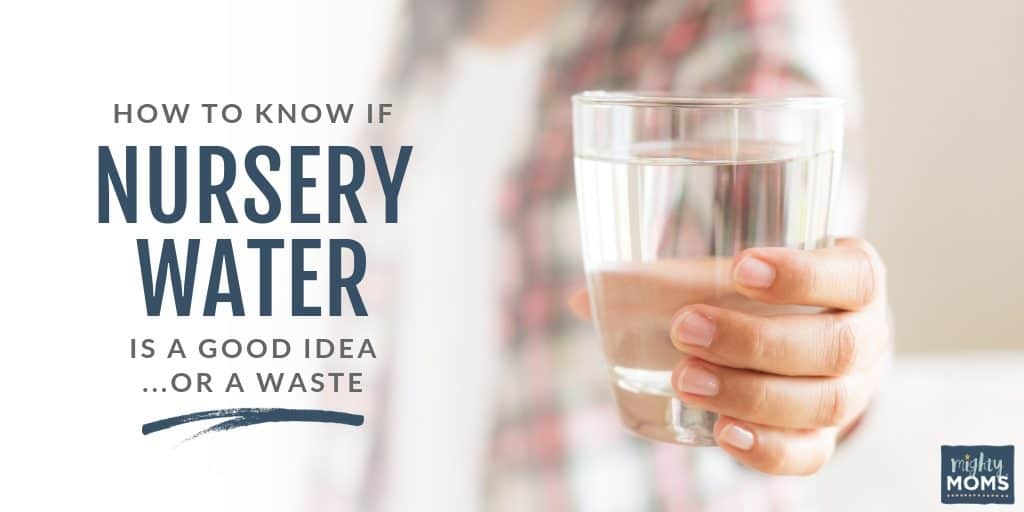Is Baby Nursery Water Same as Filtered Refrigerator Water

Like most first-time parents, I assumed that since the jug on the shelf had the phrase "Nursery Water" on it and an adorable baby face on the label, it was something I should purchase for baby formula.
After all, if it wasn't a necessity for my baby, why was it on the aisle endcap at Target?
I can hear you laughing from here.
As if everything promoted on the endcaps of Target are a necessity. (The exception is the Magnolia collection of housewares. Those are clearly a necessity.)
Perhaps you are just as lost as I was, trying to decide how to gauge your next parenting guilt-trip. Is nursery water something you really need to purchase? Or is that money better spent on some brain-boosting toys instead?
Let me break all the guilt into smaller truth-bites for you.
What are the Different Types of Nursery Water?
- Nursery Distilled Water is steam-distilled to remove impurities.
- Fluorinated Nursery Water is also steam-distilled, but has 0.7 ppm of fluoride added.
How is Your Tap Water?
Let's Find Out.
The big elephant in the room you have to address before you start looking about purchasing nursery water for your baby, is to take a long hard look at what's coming out of your tap.
Don't worry, because living in the 21st Century is freaking awesome, you don't have to buy any special strips or testing kits.
If you are on a municipal water supply (i.e. not well water) You just need one piece of information, and it's a doozy. I hope you've been keeping meticulous records, or you're totally screwed. Ready?
*deep breath*
Your zip code.
I'll give you a few minutes to go file-flipping and search for those elusive five numbers…
Got it? Great. Go here and put it in. Then select your local waterworks and see what it says.
Community Quality
First of all, try not to freak out too much…yet. No tap water is going to be completely clean. (Unless you are living in a small village in the Alps, and if you are…how do you feel about visitors? 😉 )
Your "magic number" of acceptability is going to look different than mine.
If you are seeing a large number of contaminants, it may be worth considering a filtering system in your home, or at least picking up one of the nursery water options below. Let your budget be your guide in determining whether or not you need to set aside special funds for more "pure" water.
Old Home…Old Pipes
Besides the quality of water in your community, you also have to think through the quality of water in your specific home.
Once the water arrives at your home, it has to go through a series of pipes to actually end up at the end of your faucet. If you have an older home with original or dated plumbing, it may be worth getting a purification system to avoid any clingy contaminants. (I'm looking at you lead pipes!)

A Breakdown of Terminology: Know Thy Nursery Water
Before we jump into figuring out which (if any) nursery water is best for your family, let's make sure you know what the different terms actually mean. (See the "WeLove Citations" section at the bottom for links.)
What Exactly is Mineral Water?
Mineral water contains dissolved minerals like iron, calcium, magnesium, potassium, etc. People who choose this are looking for additional minerals in their diet. Some companies will add gasses to make it "sparkling" and bubbly. It usually comes from underground reservoirs and does not get processed
What Exactly is Spring Sneaky Water?
Spring water contains almost the same spectrum of nutrients and minerals as regular tap water. The only main difference is that sometimes it has chlorine filtered out. When it says 100% "pure" it is referring to the fact that it is 100% pulled from a single source, and not from surface water.
What Exactly is Filtered Fake Water?
Filtered water is pretty much the same as your tap water. It has been "filtered" using your local water treatment facility, run through carbon filters to remove chlorine (and improve the taste) and then packaged in plastic containers.
What you are really purchasing here is the convenient plastic bottle. The water itself is almost indistinguishable from what's in your sink.
What Exactly is Distilled Water for Formula?
Nursery distilled water uses the steam-distillation process to purify the water using evaporation and condensation. (Remember those terms from 6th grade science?)
Although all distilled water is, in essence, purified water, not all purified water is distilled. That's because distillation is just one of a variety of purification techniques.
Should you used distilled water for your baby's formula? For the answer, I would refer you back to the top of this page to consider the kind of water coming out of the tap. If you're using a well, have old pipes, or other groundwater issues, using distilled water for formula may be a smart answer.
What Exactly is Purified Water?
Purified Water is as close to plain dihydrogen monoxide as you can get. (Remember that from 9th grade science?) Pretty much everything is pulled out using extra steps like reverse osmosis, distillation, or deionization.

Which Brings Us Back to Nursery Water…The Great Debate Screamfest
So here we are.
You're still reading.
This tells me that you think you may need to consider purchasing nursery water for your baby's formula (or self-use). But which type? Nursery Distilled Water? Or the Fluorinated type?
This leads us to the next question on our quest for answers…
What Exactly is Fluoride?
Fluoride is a natural mineral that helps prevent cavities in children by helping to strengthen the enamel on the outside of your teeth.
I know, I know.
Your baby doesn't have teeth.
Yet. Have you checked these signs?
For the past 70 years, fluoride has been added to community water sources in the US to fight tooth decay. The recommendation level of fluoride for an adult is 0.7 ppm (parts per million).
Want to check your local fluoride numbers by going here again and putting in your zip code. Click on "Other detected contaminants" and select "fluoride." It will show you where your local levels are.
Should You Choose the Fluoride Nursery Water?
As most things in parenting, choosing fluorinated nursery water is a decision between you and your pediatrician. That said, here are a few things to keep in mind as you decide.
- Fluorosis is when a child gets too much fluoride in their diet before the age of eight. It leaves permanent white spots on the teeth. The good news is it's only cosmetic. Still, it's good to know that, like most things in life, there should be limits.
- If you use well water for your home, it may be worth getting the water tested every few years to see where things stand. Too much lead could be harmful to your child's development, and knowing where the fluoride level is can help you determine whether to supplement with nursery water. This article shows you how to test your well water.
- If you live outside the US, contact your local city to see what their standards are or consider choosing a different water source to make sure your family is getting the minerals you need (and avoiding bacteria and other contaminants.)
The Only Baby Formula Without Added Fluoride
If you're concerned about giving your baby too much fluoride and seeing those white spots (Fluorosis) show up on their teeth later, you may want to consider using a baby formula that doesn't contain added fluoride.
According to this list, ALL of the infant formulas (organic, etc.) contain added fluoride. There's only one formula that doesn't. That formula is Kabrita Goat Milk Formula.
I am a huge fan of Kabrita Goat Milk Formula for lots of reasons, but the no-added fluoride makes me love them even more. I don't think fluoride is bad, but I do worry my kids get too much sometimes.
If you haven't tried them yet, I would highly recommend taking them up on their free sample offer here.
The Great Debate Screamfest
I probably get more emails about this topic than any others. People have some STRONG opinions about fluoride, let me tell you!
So, I'm going to do what I do best: Refuse to take a side.
Okay, okay, I do have a side, but that's for my family, not yours. You are an adult, right? So I will allow you to take the reins from here and make your own decisions, even if those end up looking different than mine. 'Murica!
Here are the top websites and their commentary on the issue of fluoridation. (Listed in no agenda-driven order.)
- The American Dental Association
- Centers for Disease Control
- Fluoride Alert
- Medical News Today
- Wikipedia
Happy reading!
The Take-Away About Nursery Water
Sadly, I have to finish this article with an "it depends" clause. Remember, MightyMoms.club isn't here to tell you what to do. We are here to provide enough information for you to decide that for yourself.
Be warned, though, there is a LOT of fighting online about fluoride = poison.
As with most things, use your critical thinking skills to determine whether you should introduce nursery water for your baby or not.
Join the Mom Club
You Are Mighty
Even if you don't feel like it.
Join our little club of mothers and get a copy of 101 Ways to be an Awesome Mom as a free gift. It's guaranteed to encourage you!
We ♥ honesty! This post contains affiliate links that provide extra money for our mutual coffee habits addictions. Click here to learn more. As an Amazon Associate I earn from qualifying purchases.
We Love Citations!
What are the health benefits of mineral water? MedicalNewsToday.com
Types of Water. DrinkMoreWater.com
Fluoride. MouthHealthy.org
Current Fluoride Recommendations for the Pediatric Patient. USPharmacist.com
A Mom's Guide to Fluoride. MouthHealthy.org
Fluorosis. WebMD.com
Fluoride Levels of Human Plasma and Breast Milk. NIH.gov
Does Your Infant Formula Contain Fluoride? SafeBabyHealthyChild.com
Is Baby Nursery Water Same as Filtered Refrigerator Water
Source: https://www.mightymoms.club/baby-items/nursery-water/
0 Response to "Is Baby Nursery Water Same as Filtered Refrigerator Water"
Post a Comment